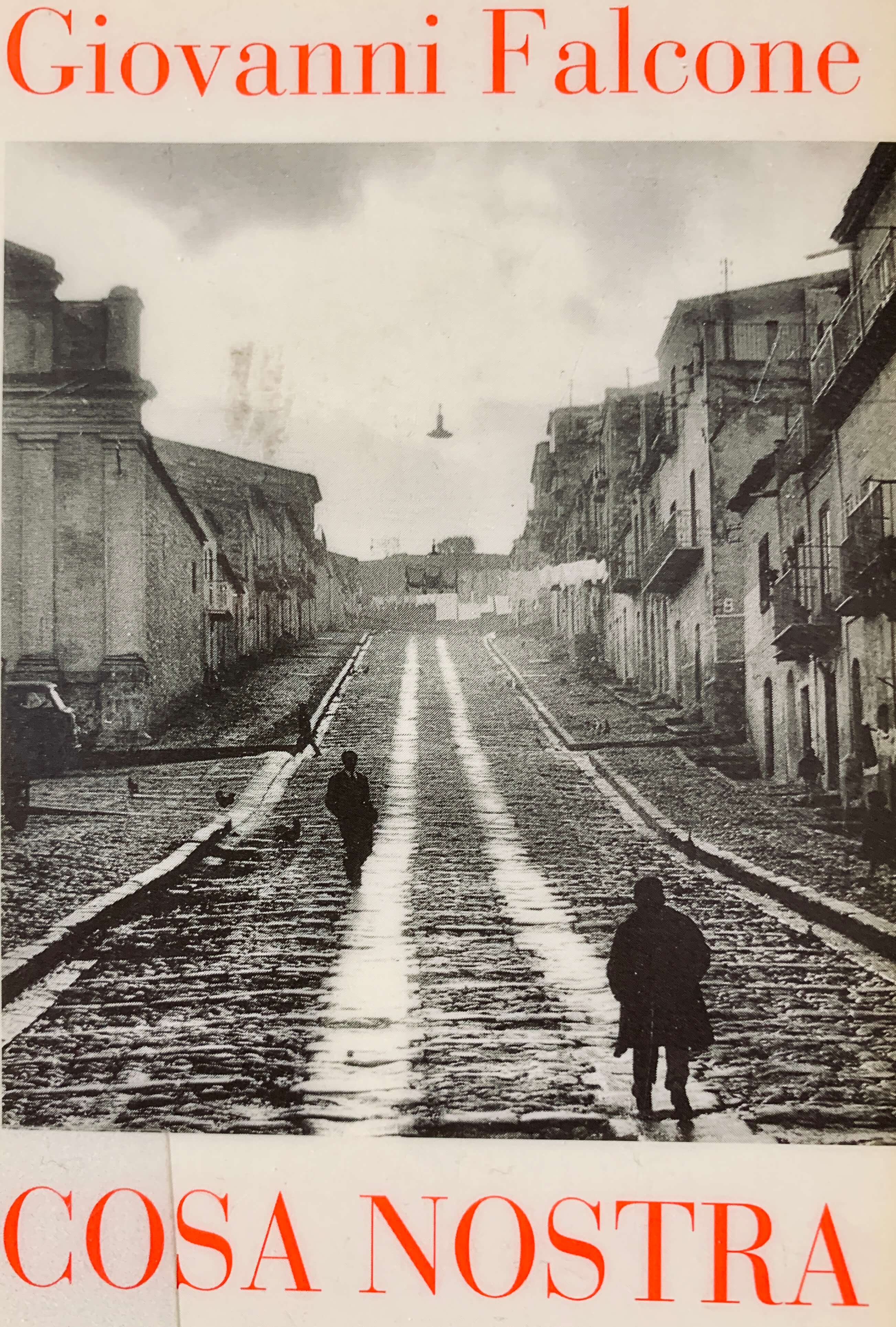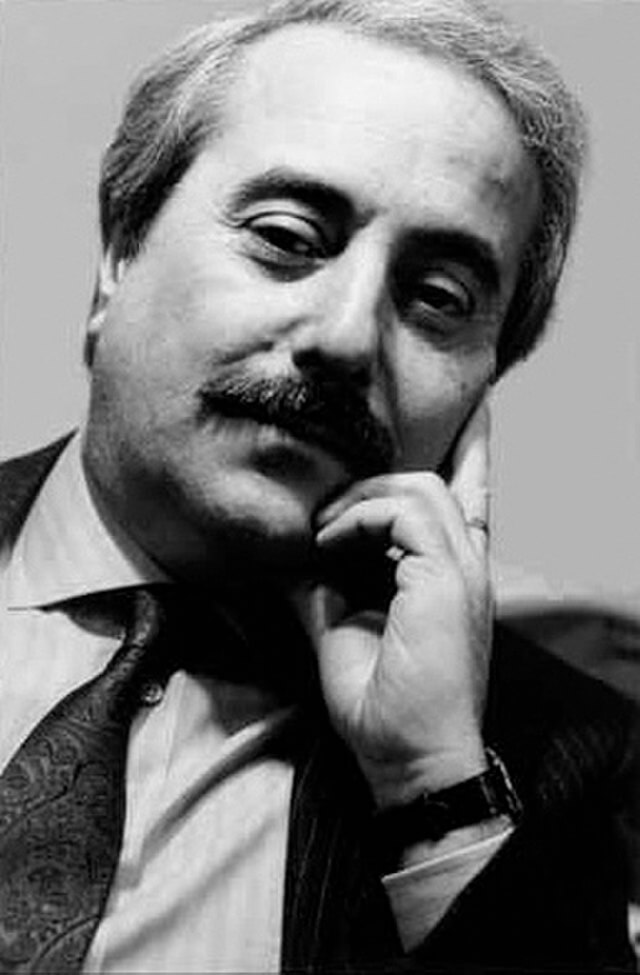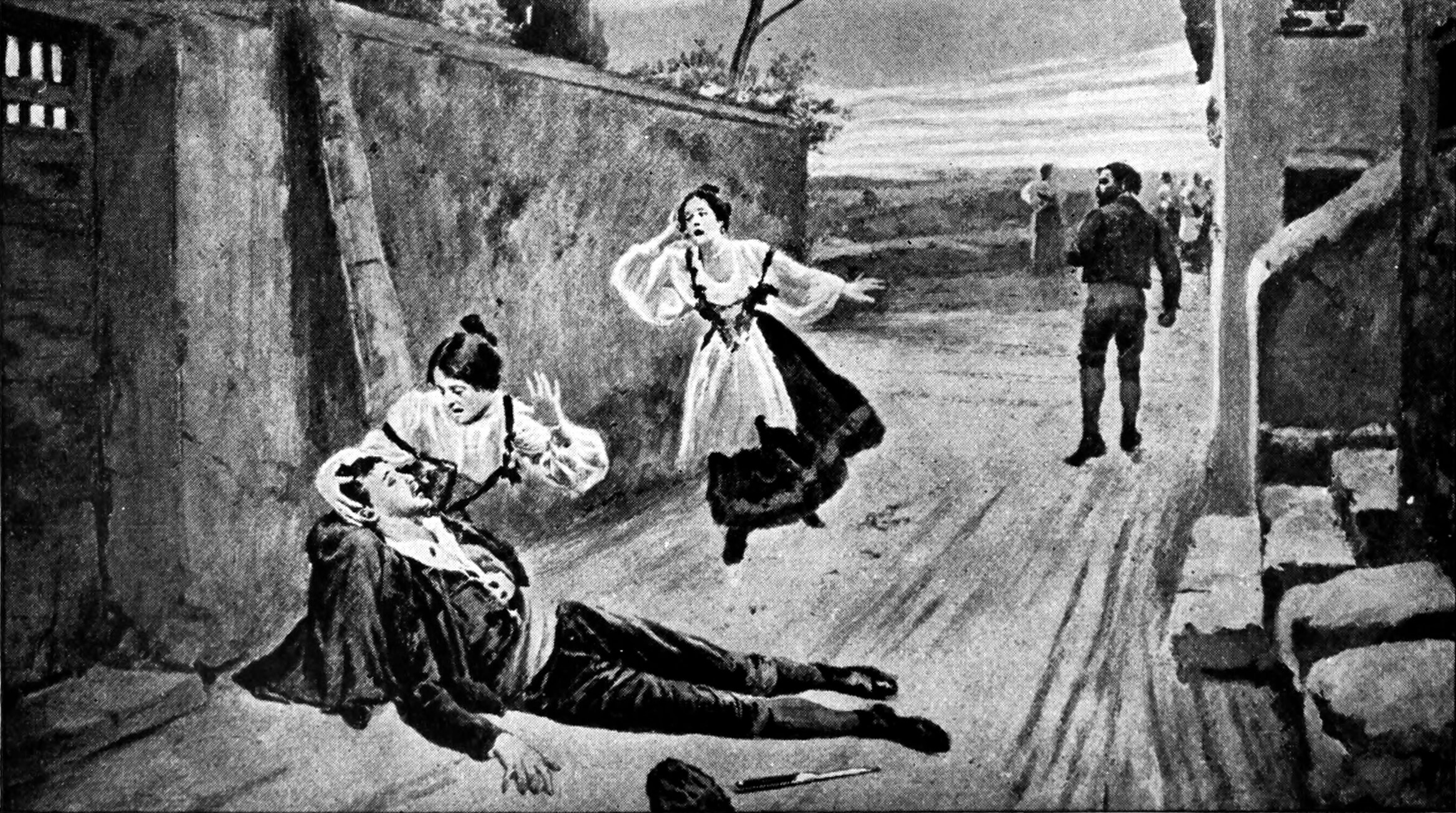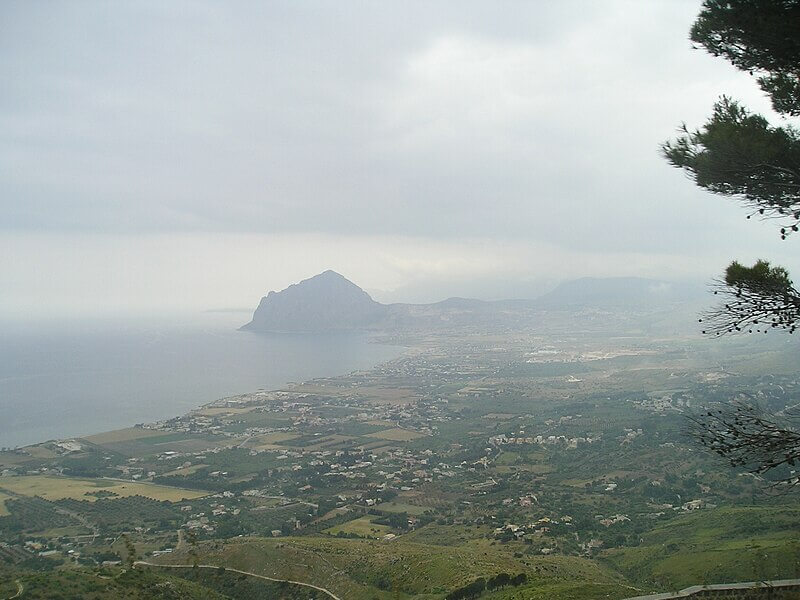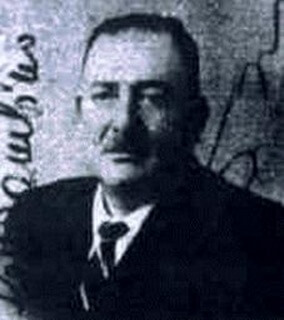- Home
- History of Sicily
- History of the Mafia
- Tommaso Buscetta
The Story of Tommaso Buscetta: From Mafia Boss to Key Witness
Few stories in the murky world of organized crime are as captivating as that of Tommaso Buscetta. This intriguing figure went from being a high-ranking member of the Sicilian Mafia to becoming a key witness against his former associates.
The legendary prosecutor Giovanni Falcone described Buscetta as an elegant but complex man with rare talents and stunning influence over other Mafia figures.
Born in 1928 in Palermo, Italy, Buscetta's early life was immersed in the criminal underworld. He started as an ordinary hired killer but rose rapidly through the ranks.
As one of the top Mafia bosses, Buscetta played a significant role in the Cosa Nostra's unprecedented expansion through its worldwide heroin distribution network.
Buscetta liked to present himself as a member of the Mafia's old guard—the "good old Mafia." Of course, there never was such a thing; it was just that each new generation was more brutal than the last.
Buscetta experienced this personally when "The Beast of Corleone," Toto Riina, set out to kill his enemies, Buscetta among the first of them.
In the end, faced with a certain death, Buscetta decided to cooperate with authorities. He shattered the traditional omertà code of silence with the famous judge Giovanni Falcone, providing unprecedented insight into the inner workings of the Cosa Nostra.
This groundbreaking collaboration changed his life and the course of criminal history. Buscetta's testimony ended the Cosa Nostra's reign over Sicily.
This is the story of Tommaso Buscetta, retracing his rise within the Mafia ranks, his decision to become an informant, and his testimony's far-reaching impact.
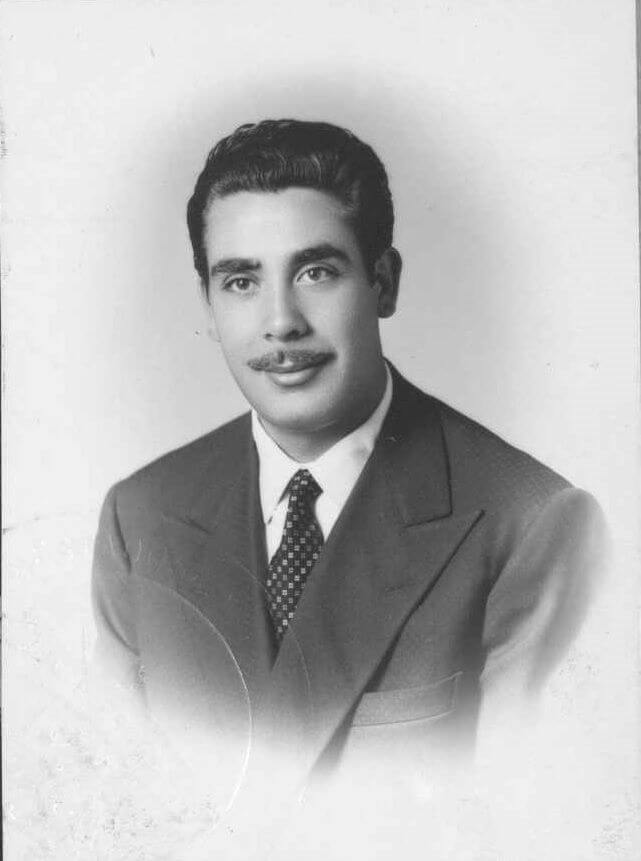 Tommaso Buscetta as a newly made mafioso.
Tommaso Buscetta as a newly made mafioso.Early Life and Involvement in the Mafia
Born in 1928 in Palermo, Sicily, Tommaso Buscetta's early life was marked by the pervasive influence of the Sicilian Mafia.
Even before joining the notorious organization, young Tommaso was seen swaggering around the slum quarter of Oreto in Palermo with pomaded hair and a pencil mustache, dressed in typical Mafia style.
In the poor neighborhoods of Palermo, the Mafia was the only path to success. Its members were looked up to. They were above the law and other citizens—the cream of the crop.
Buscetta said he was a natural mafioso long before he became involved in the organization. Once he became an official member, everything he was told was already familiar to him.
He was 'made' - meaning recruited - into the Mafia when he was eighteen. After that, the rights and responsibilities of an average human being no longer applied to him.
"Once in, never out" was the Mafia's motto. There was no turning back now. Not that Tommaso would have ever wanted it.
The mafiosos were accountable to no one but the organization for their actions. They could rob, extort, cheat, bully, lie and kill. Ordinary people were seen as only half-human. To the Mafioso, their existence had no real meaning.
Judges, juries, witnesses, and politicians were all up for grabs. The Mafiosos got drunk on their own power, which was virtually unlimited. So what if you died young? Better that than to live a long life as only half a man.
There were only a few rules regarding the mafioso. You had to listen to your boss and follow orders without question. You could lie to outsiders but never to another member. The penalty for disobedience was death.
Over the years, the Mafia's rules became increasingly flexible until they no longer existed. But one rule was always absolute: a member had to kill someone before being permitted to join the organization. Every member of the Cosa Nostra had to be an assassin.
Buscetta quickly rose through the ranks, demonstrating a keen intellect, a ruthless personality, and an unwavering loyalty to the organization.
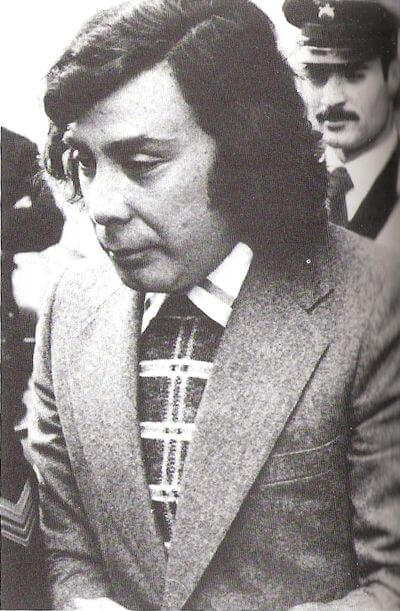 Mafia boss Tommaso Buscetta in his prime.
Mafia boss Tommaso Buscetta in his prime.Rise to Power and Leadership in the Mafia
Buscetta was a city-dweller by nature. As a mafioso, he dressed well and enjoyed the pleasures of Palermo's upper classes: he went to the theatre and the opera, joined social clubs, and courted women.
The latter was not looked upon favorably in Mafia circles of the time. Decades later, after Buscetta turned witness "The Beast of Corleone," Toto Riina invoked this in court. The man who was responsible for hundreds of lives tried to undermine Buscetta's credibility as a witness by calling him a womanizer.
Buscetta's initial sources of income were cigarette smuggling and construction contracting - both popular sources of revenue in the Mafia circles at the time. Life was spent traveling from country to country, staying in luxury hotels in the company of the latest girlfriend.
Creation of The Mafia Commission in Sicily
One of Buscetta's most remarkable achievements in the Sicilian Mafia was creating The Commission, which the famous gangster Charles "Lucky" Luciano assisted him in.
Luciano had been deported from the United States back to Italy after the Second World War. Buscetta came to know Luciano when he was just a young boy. The legendary gangster took the young Tommaso under his wing.
In the United States, Luciano had helped set up a committee of twelve Mafia bosses, which he unofficially headed. The commission's task was to draw up internal Mafia rules, establish territorial boundaries, settle internal disputes, and decide who to kill.
In 1957, Luciano proposed to Buscetta that a similar commission be set up in Sicily. The decision was formalized in October of that year.
The meeting took place at the Hotel des Palmes in Palermo. The heads of the US and Sicilian mafias were present. The meeting had far-reaching consequences: it decided on cooperation between the Sicilian and US mafias to supply heroin to America.
In 1963, Buscetta was one of Italy's ten most wanted Mafia leaders. The Anti-Mafia Commission described him as a killer, vicious, aggressive, and involved in a wide range of criminal activities. He was also said to enjoy the company of the biggest names in the US underworld.
How to Get Rich Quick: The Sicilian Mafia Goes into the Heroin Business
Getting into the heroin business meant the start of a golden age for the Sicilian Mafia. At the same time, it sowed the seeds of its downfall. As the riches kept getting bigger, greed blinded the minds of the mafiosos.
In the sixties, as heroin started to flow, the increasingly brutal violence led to a virtual war with law enforcement. This, in turn, led to something that had never happened before in Sicily: the general public rose up against the Mafia.
With their backs against the wall, many mafiosos fled the country, spreading the Cosa Nostra's businesses worldwide.
In 1971, it was Buscetta's turn to flee. He took his eldest son with him and moved to Brazil. Before long, he also found a new love in Copacabana.
Maria Cristina Almeida de Guimaraes was twenty years younger than Tommaso. She came from a good family. She was wealthy, educated, intelligent, and well-connected. Buscetta had found not only the love of his life but also a new business partner.
During the 1970s, Buscetta and his partners filled the streets of the United States with heroin. Tons of it flowed from Sicily to America - so much so that dealers began offering free samples to attract more customers.
The trade took off, and the number of heroin addicts in America exploded. The amount of heroin being trafficked kept increasing. Buscetta had just signed a contract to ship three and a half tons of heroin to the US every year when his business came to an abrupt end.
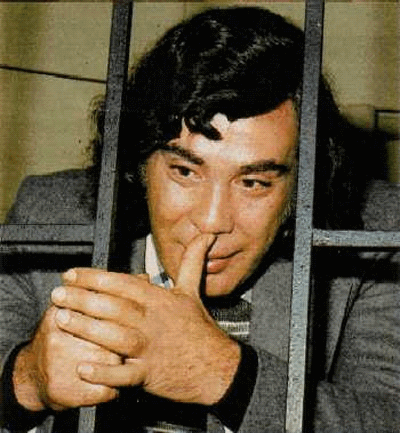 Behind the bars.
Behind the bars.The Law Reaches Buscetta
Buscetta was arrested in Brazil and sent back to Italy. The next eight years he spent in prison.
After his release, his old friends tried to persuade him to get rid of a new problem: "the peasants," as they called them, from Corleone had planted their moldy paws on the golden gates of Palermo.
Buscetta refused the offer. The Mafia had changed, and he no longer wanted to get involved in internal quarrels. Besides, he had promised his children he would return to Brazil.
"I wish you luck in your fight against the peasants. You know that I never liked them," were his parting words.
Later, Buscetta boasted that he could have destroyed the Corleoneans with his contacts just like that if he had just happened to be in the mood. He was no less aggressive; he was just more intelligent.
The Corleoneans soon proved that neither Buscetta nor anyone else could destroy them. They were the ones who would take care of the destruction.
The Rise of the Corleoneans
In Sicily, the Mafia was certainly not what it used to be. All the old principles had been thrown away. The new boss of the Corleoneans, Salvatore "Toto" Riina, saw to that.
Riina turned the former secret society into a dictatorship whose power was based solely on terror. An internal purge of the Mafia followed, with the streets of Palermo filled daily with new corpses.
If before there had been a need for some agreed reason for killing, now the only reason was to keep Riina in power. The slightest suspicion was enough to get one the death penalty. And Riina didn't look at who he killed. Men, women, and children alike were ruthlessly tortured, murdered, and dissolved in acid.
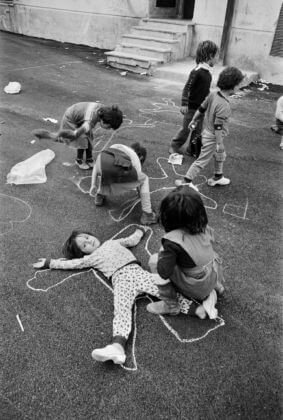 Children playing on the streets of Palermo during Riina's purge in the early eighties.
Children playing on the streets of Palermo during Riina's purge in the early eighties.At first, Riina murdered the friends of the other Mafia bosses, and then he killed the bosses themselves. There was only one capo in Sicily, and his power extended everywhere.
The bloodshed is now known as the 1981-1983 Mafia War. In reality, it was not a war but a massacre. Increasingly paranoid - and therefore more brutal - Riina sowed terror everywhere.
An estimated 1,000 Mafiosos were killed in Riina's purges - not to mention all the other casualties. No one in the Corleone family died.
After killing all his opponents in Sicily, Riina turned his attention to those who had fled the country. At the top of the list was Tommaso Buscetta.
As Riina was unable to get his hands on Buscetta himself - he being in Brazil - he started killing his relatives instead. The first to go was the brother of Buscetta's first wife. Then, Buscetta's own brother, who was a farmer with nothing to do with the Mafia.
Next, Buscetta's two sons, who ran a pizzeria in Palermo, disappeared.
In quick succession, the murderers also killed his son-in-law, brother, nephew, and an old friend. Sometimes, the only reason was that someone had met Buscetta and said they had a good impression of him.
Riina aimed to ensure that if Buscetta ever returned to Italy, he would have no friends left there. He almost succeeded. But there was still one friend left - on the other side of law.
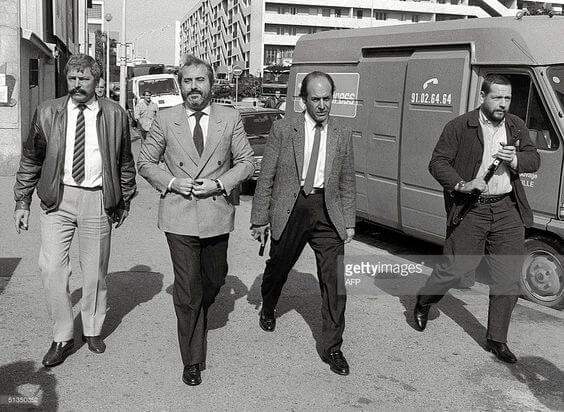 Judge Falcone with his Bodyguards.
Judge Falcone with his Bodyguards.The Second Capture of Tommaso Buscetta
Soon, Buscetta was in trouble with the law again. The US authorities had at last got a whiff of a Sicilian heroin ring. Buscetta was arrested in Brazil by the local police.
The police tortured him to get him to confess. Buscetta was given electric shocks to his genitals, anus, teeth and ears. The police even tore off his toenails. He only said, "My name is Tommaso Buscetta..."
When nothing else helped, the police took both Buscetta and his pregnant wife on a flight. Over Sao Paulo, the police grabbed the pregnant Cristina by the hair and hung her in the doorway of a skydiving plane.
Cristina fainted. Still, Buscetta did not speak.
In a cell, Tommaso Buscetta tried to kill himself. He was about to get extradited to Italy once more. He knew what was waiting for him there. Riina's power extended everywhere. There was no way to survive the clutches of this vengeful beast.
On the plane, on his way to Italy, he said to the police he wanted to talk. But not now. He would only speak to one person: Judge Giovanni Falcone.
For years, Falcone had worked tirelessly to put the Mafia behind bars. He was the only person Buscetta felt he could trust.
The Star Witness in the Maxi Trial
Buscetta told Falcone everything he knew about the Cosa Nostra. This led to a colossal trial in Sicily. The "maxi trial" held hundreds of mafiosos, including Toto Riina and his Corleoneans, accountable for their crimes.
Buscetta's weight as a witness was linked to his high position in the Mafia hierarchy. He had been a well-known Mafia leader for several decades. His organization's tentacles extended worldwide, from Turkey to Italy, Brazil, Mexico, Canada, and the United States. Since the Second World War, he had been at the heart of the Mafia's development.
When Buscetta stepped into Palermo's bomb-proof courtroom to testify, the courtroom fell silent. The Mafiosos, who had made a mockery of justice all their lives, fell silent. In the hall, you could have heard the needle drop.
Buscetta testified for a week. Thanks to him, 464 Mafiosos were indicted.
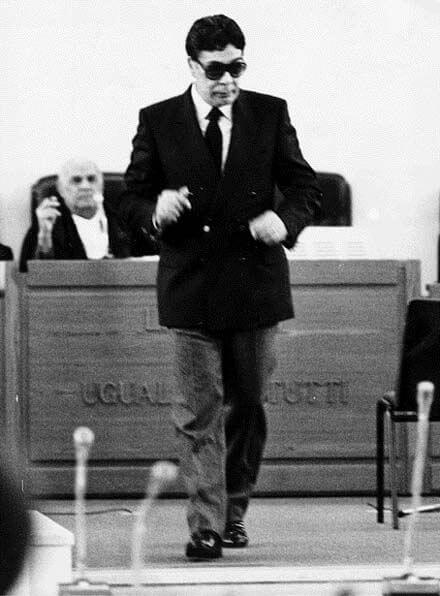 Buscetta testifies.
Buscetta testifies.Life After Buscetta's Testimony
Buscetta's testimony ended the Sicilian Mafia as it was known until then. Toto Riina managed to escape. His madness no longer knew bounds.
Now, Riina declared war on the entire Italian state. This time, the state was prepared and won the battle. Riina was put behind bars, this time for good. He never confessed to any crime. According to his words, he was just a regular farmer from Corleone.
After Italy, Buscetta testified in the United States and spent the rest of his life in a witness protection program in the U.S.
The ordinary life of a family man was a far cry from what he was used to in his heyday. He died in Florida in 2000 of natural causes, surrounded by his family.
(Page last edited: March 30, 2025)
Recent Articles
-
Car Rental in Sicily: A Traveler’s Guide
Feb 04, 26 01:09 PM
Planning car rental in Sicily? Learn costs by season, insurance basics, required documents, and more. -
The Best Things to Do in Sicily, From Antiquity to the Present
Feb 01, 26 09:01 AM
Explore the best things to do in Sicily through historic cities, Greek ruins, volcanoes, islands, and landscapes -
White Wines of Sicily: A Guide to Sicily's Best Varietals
Jan 06, 26 05:46 AM
Discover the unique white wines of Sicily, from the famous Grillo to the lesser-known varieties.
Follow MANY FACES OF SICILY on Facebook, Instagram, Bluesky & Tumblr
Contact: vesa@manyfacesofsicily.com
